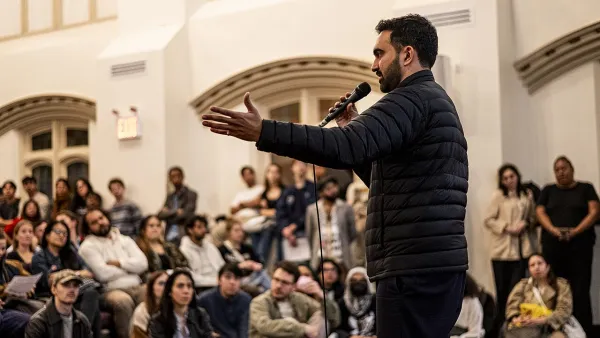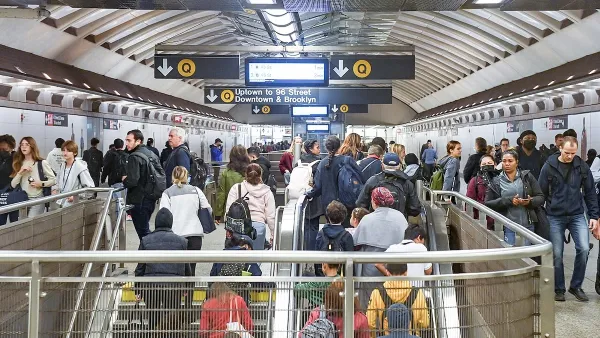Former New York City mayor Ed Koch passed away on Friday at the age of 88. For the popular figure who was known for stopping constituents on the street to ask, “How’m I doin’?”, Joseph Berger endeavors to deliver an answer.
"There is no doubt that Mr. Koch restored the spirit of the city after years of urban decay that had crystallized in the city’s near bankruptcy, and that reached a nadir of sorts in 1977 with the Son of Sam killings, a blackout and riots," writes Berger. "Mr. Koch, a Democrat, took office in January 1978 and, with his moxie, was able to quickly create a sense among New Yorkers that someone was fighting to turn the city around."
“The city needed hope, it needed a champion, it needed a voice,” said Mitchell Moss, a professor of urban policy at New York University. “Ed Koch became that voice.”
But what were the substantive accomplishments that turned the city around? "Experts cite the investment of billions of dollars in rebuilding abandoned housing, which revived desolate areas of the South Bronx, Harlem and central Brooklyn; the restoration of the city’s fiscal integrity to the point where banks and government watchdogs were ready to let it manage its own finances; the rehabilitation of neglected parks; the genesis of Times Square’s transformation from a sleazy, dangerous crossroads to a family-friendly entertainment and office center; the trading in of federal money designated to build a new West Side Highway for money that would buy subway trains and buses; the pressure on the Metropolitan Transportation Authority to virtually eliminate subway graffiti; and the enacting of a campaign finance law in 1988 under which candidates would limit their spending in exchange for receiving public matching funds."
To look at the differences between New York City during Edward Koch's mayoralty and today is to see a dramatically changed city. Over the past thirty years, the city's white population has seen a steady decline while income inequality has increased. And after public spending on affordable housing rose dramatically during Koch's tenure (doubling between 1986 and 1987 and tripling between 1987 and 1988) it has remained at a higher level since his departure than it was before he took office.
Berger details the "blunt-spoken and theatrical" mayor's legacy in key areas: housing, parks, crime, health, race relations, and transit.
FULL STORY: So, How’d He Do?

Planetizen Federal Action Tracker
A weekly monitor of how Trump’s orders and actions are impacting planners and planning in America.

Map: Where Senate Republicans Want to Sell Your Public Lands
For public land advocates, the Senate Republicans’ proposal to sell millions of acres of public land in the West is “the biggest fight of their careers.”

Restaurant Patios Were a Pandemic Win — Why Were They so Hard to Keep?
Social distancing requirements and changes in travel patterns prompted cities to pilot new uses for street and sidewalk space. Then it got complicated.

Platform Pilsner: Vancouver Transit Agency Releases... a Beer?
TransLink will receive a portion of every sale of the four-pack.

Toronto Weighs Cheaper Transit, Parking Hikes for Major Events
Special event rates would take effect during large festivals, sports games and concerts to ‘discourage driving, manage congestion and free up space for transit.”

Berlin to Consider Car-Free Zone Larger Than Manhattan
The area bound by the 22-mile Ringbahn would still allow 12 uses of a private automobile per year per person, and several other exemptions.
Urban Design for Planners 1: Software Tools
This six-course series explores essential urban design concepts using open source software and equips planners with the tools they need to participate fully in the urban design process.
Planning for Universal Design
Learn the tools for implementing Universal Design in planning regulations.
Heyer Gruel & Associates PA
JM Goldson LLC
Custer County Colorado
City of Camden Redevelopment Agency
City of Astoria
Transportation Research & Education Center (TREC) at Portland State University
Camden Redevelopment Agency
City of Claremont
Municipality of Princeton (NJ)





























